We may receive a commission when you use our affiliate links. However, this does not impact our recommendations.
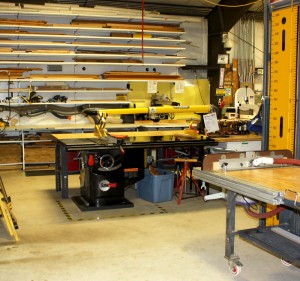 When I think of a hobbyist woodworker I tend to think of a middle aged guy with a mix of tools parked in a corner of a basement or garage. That’s the demographic of our readers, more or less. Many of our them are space challenged, sharing their shops with water heaters, automobiles, or any number of household items. We also have a lot of readers that are new to woodworking and are stuck in “getting ready” mode. They think they might enjoy the craft, but for the moment they are limited to dreaming, planning, saving, acquiring tools and setting up shop. All of us from time to time face a task that would be ridiculously easy, if we had the proper equipment and the know-how to run it.
When I think of a hobbyist woodworker I tend to think of a middle aged guy with a mix of tools parked in a corner of a basement or garage. That’s the demographic of our readers, more or less. Many of our them are space challenged, sharing their shops with water heaters, automobiles, or any number of household items. We also have a lot of readers that are new to woodworking and are stuck in “getting ready” mode. They think they might enjoy the craft, but for the moment they are limited to dreaming, planning, saving, acquiring tools and setting up shop. All of us from time to time face a task that would be ridiculously easy, if we had the proper equipment and the know-how to run it.
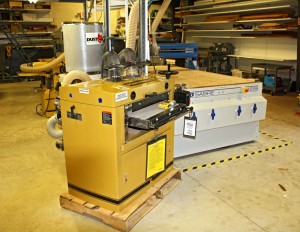 The picture above is not the really nice workshop of a single woodworker. It is one small corner of a new alternative, called a makerspace. Yesterday we went up the road to Columbus, Ohio and visited BuildMore Workshop and the Columbus Idea Foundry two different takes on an idea that is sweeping the country. The easy way to explain a makerspace is to compare it to a health club. With most, you pay for the time you use it, either an hourly, daily, monthly or yearly rate. The cost per hour drops with a longer commitment. Most facilities require that you take a basic safety and operations class. After that, you bring in your material and use the equipment.
The picture above is not the really nice workshop of a single woodworker. It is one small corner of a new alternative, called a makerspace. Yesterday we went up the road to Columbus, Ohio and visited BuildMore Workshop and the Columbus Idea Foundry two different takes on an idea that is sweeping the country. The easy way to explain a makerspace is to compare it to a health club. With most, you pay for the time you use it, either an hourly, daily, monthly or yearly rate. The cost per hour drops with a longer commitment. Most facilities require that you take a basic safety and operations class. After that, you bring in your material and use the equipment.
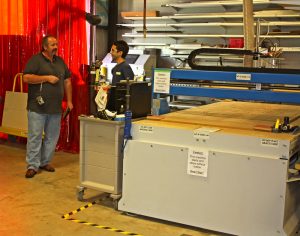 There are several obvious advantages to this arrangement. The equipment is usually far better than the average hobbyist can afford. The reader wondering if woodworking is for them in the first paragraph can rent some time this weekend and find out. No lengthy wait, no big expense, no complaints from the neighbors when you turn on the planer. You can get to making stuff right away.
There are several obvious advantages to this arrangement. The equipment is usually far better than the average hobbyist can afford. The reader wondering if woodworking is for them in the first paragraph can rent some time this weekend and find out. No lengthy wait, no big expense, no complaints from the neighbors when you turn on the planer. You can get to making stuff right away.
If you’re curious about moving up to CNC routing, laser engraving or a major equipment purchase you can take one for a test drive. Need to sand a tabletop? Toss it in the car and use the big thicknessing sander. While there are woodworking-only makerspaces, cooperative shops and wood shops managed by local clubs, most makerspaces offer access to more tools including 3D printers, electronics, robotics and metalworking equipment. Columbus Ideal Foundry has a large enough facility to include jewelry, glass and blacksmithing areas in addition to wood and metal working.
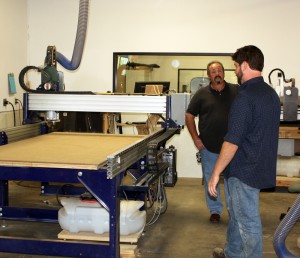 Exposure to tools of different crafts (and the folks who are into those crafts) can generate new ideas for woodworking, and for incorporating other materials into projects that are mostly wood. It also makes life easy for those times when you need to weld, cut, bend or machine something. A plasma cutter trumps a hack saw every time. I normally dismiss thoughts about incorporating metal or other non-wood material into my projects because I would have to track down someone to do that work, or tool up to do it. With a membership to a local makerspace, those barriers are removed, my horizons are expanded and my work becomes more interesting. In addition to the tools and technology, a friendly and helpful community is a vital part of makerspaces.
Exposure to tools of different crafts (and the folks who are into those crafts) can generate new ideas for woodworking, and for incorporating other materials into projects that are mostly wood. It also makes life easy for those times when you need to weld, cut, bend or machine something. A plasma cutter trumps a hack saw every time. I normally dismiss thoughts about incorporating metal or other non-wood material into my projects because I would have to track down someone to do that work, or tool up to do it. With a membership to a local makerspace, those barriers are removed, my horizons are expanded and my work becomes more interesting. In addition to the tools and technology, a friendly and helpful community is a vital part of makerspaces.
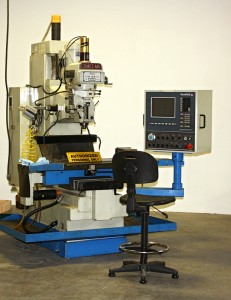 People go to these facilities to have fun creating things in their chosen medium, or in a combination of media. There will almost always be someone on the staff, or another member to give advice, share techniques, or talk you out of doing something crazy. In addition to classes on the very basics most facilities offer additional classes.
People go to these facilities to have fun creating things in their chosen medium, or in a combination of media. There will almost always be someone on the staff, or another member to give advice, share techniques, or talk you out of doing something crazy. In addition to classes on the very basics most facilities offer additional classes.
Here at Popular Woodworking Magazine, we haven’t written much about CNC routers or laser engravers for woodworking. One of the reasons is that we don’t like to do stories that require equipment that is out of reach for most of our readers. With the growth of makerspaces around the country, we need to re-examine that. We found ourselves thinking of all the cool things we could do with the access to better technology.
A feature article on makerspaces (and community woodshops) will appear in an upcoming issue of Popular Woodworking Magazine. Eventually we plan on dedicated space on our website to list locations across the country, events and stories . If there is a “woodworker friendly” place to work with wood in your area, let us know by adding a comment or sending an e-mail.
We would like to thank the following for having us in and showing us around. Take a look at their websites, and look around in your neighborhood.
Brian Blum of BuildMore Workshop in Dublin, Ohio.
Matthew Hatcher and Casey McCarty of Columbus Idea Foundry in Columbus, Ohio.
Make sure you don’t miss the upcoming magazine story, click here to subscribe to the print or digital version of the magazine, or both.
Here are some supplies and tools we find essential in our everyday work around the shop. We may receive a commission from sales referred by our links; however, we have carefully selected these products for their usefulness and quality.







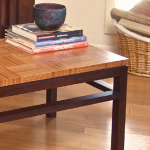

In economic development parlance, these places are called “business Incubators”.
The Woodworkers Guild of South Jersey meets at The Factory, a makers space in Collingswood, NJ.
Here’s The Factory’s web site where contact and a lot of other info is available. http://www.thefactoryworkers.com
Joe Coleman,
WGSJ secretary
Probably not all are on here, and some here may have fallen into the black hole of business defeat.
http://makerspace.com/makerspace-directory